Opportunities and challenges of the first Civic Technology Hackathon in Encarnación
Tinkering with open source and civic engagement
23 de Agosto de 2023
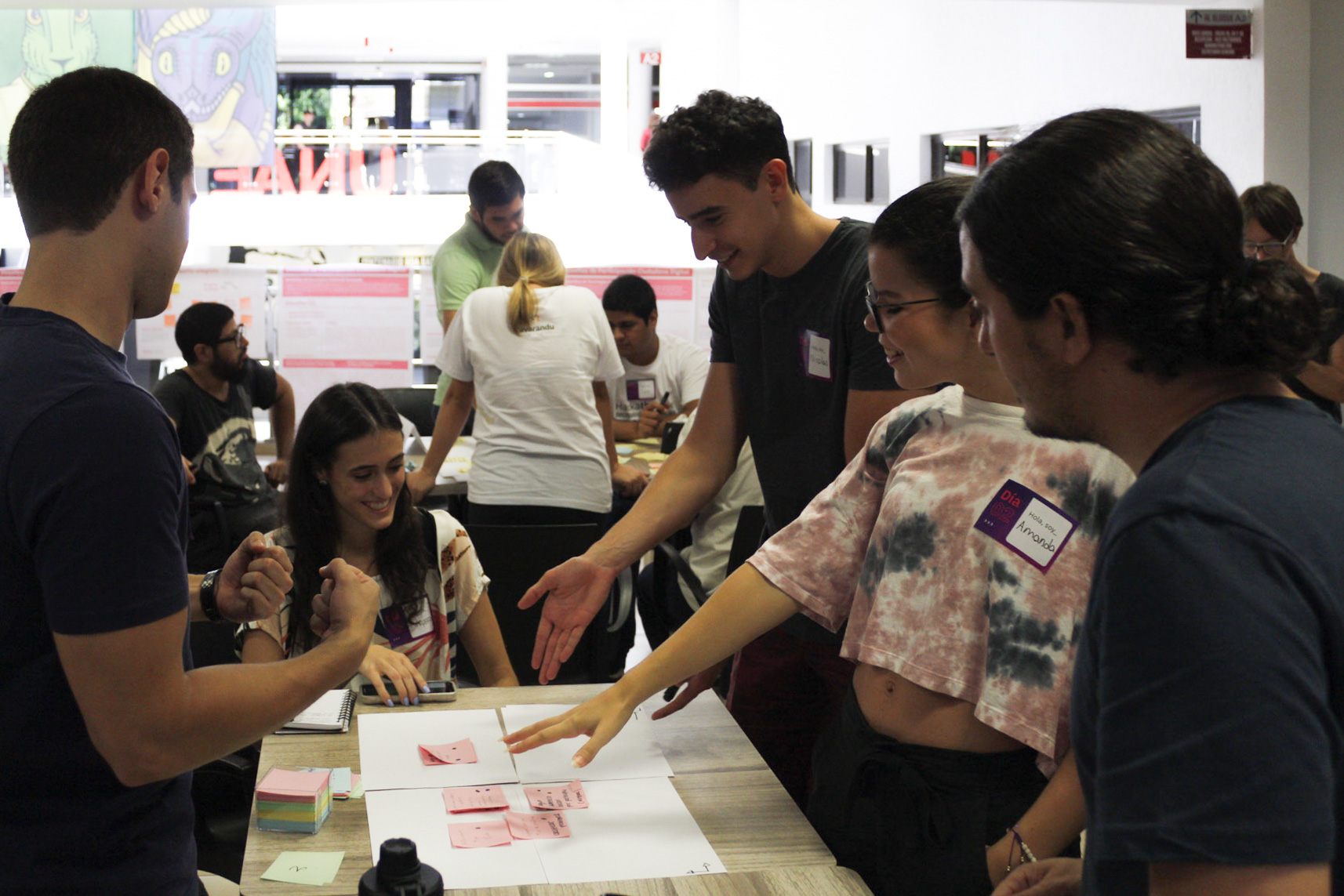
Citizen participation sits at the cornerstone of any open democratic society. The civic engagement spaces and processes that facilitate this participation allow citizens to be more directly involved in the discussion and resolution of political, economic and social challenges, increasing the levels of trust between people and communities, institutions, improving the resilience of communities and generating a greater sense of ownership and empowerment over the decisions and actions that affect the resources shared by all.
In recent years, technology has expanded to all areas of our lives, and citizen participation has not been the exception. Digital platforms for participation have emerged and matured in the last decade, bringing new opportunities and challenges to participatory governance processes. Civic technologies hold the promise of increasing the scope of citizen participation processes, challenging conventional paradigms of collective action [1], and making it possible to, at the very least, reconsider the limitations of time and space that are thought to make the exercise of direct democracy something impossible beyond the small scale[2]. In this context, what are the real barriers of and opportunities for the use of civic technologies in local governments of Paraguay? With this question in mind, we organized the first Hackathon of Civic Technologies in Encarnación, Paraguay, an emerging city in the south of the country, to create a small space to learn and explore possible answers.
A Hackathon in Paraguay’s south
To face the challenge of citizen participation in local governments of Paraguay, we created Tavarandu, a program that articulates initiatives to experiment, promote and strengthen the culture of participation in our country. The Hackathon is one of those initiatives, in which we begin an exploration of the potential of information and communication technologies to complement citizen participation processes, through the design and construction of digital solutions for citizen participation.
How does this look in practice? In April 2023, we concluded the first Civic Technology Hackathon in the city of Encarnación: during an intense weekend and against the clock, citizens committed to the development of their communities, met in a space for free learning and experimentation for 50+ hours. About 30 young people from different parts of the country participated, including professionals, students, and enthusiasts of programming, design, and social activism. During the weekend, they collaborated to design and build simple digital prototypes for citizen participation in different existing challenges at the local level in our country, using the open source platform Decidim.org as a starting point and inspiration.
53 hours of thinking, designing and programming to promote citizen participation
6 teams of students and professionals in the areas of programming, design, UX design, system analysis, computing, community managers, public servants, representatives of civil organizations and those interested in civic technologies, participated in this three-day event and developed chatbots, applications and platforms to face various social challenges of digital citizen participation presented during the first day of the event.
Guided by a group of renowned national and international mentors, the teams arrived to the third day of the Hackathon with a developed demo of their proposals and presented them to the jury, to get one of the two winning places in the event.
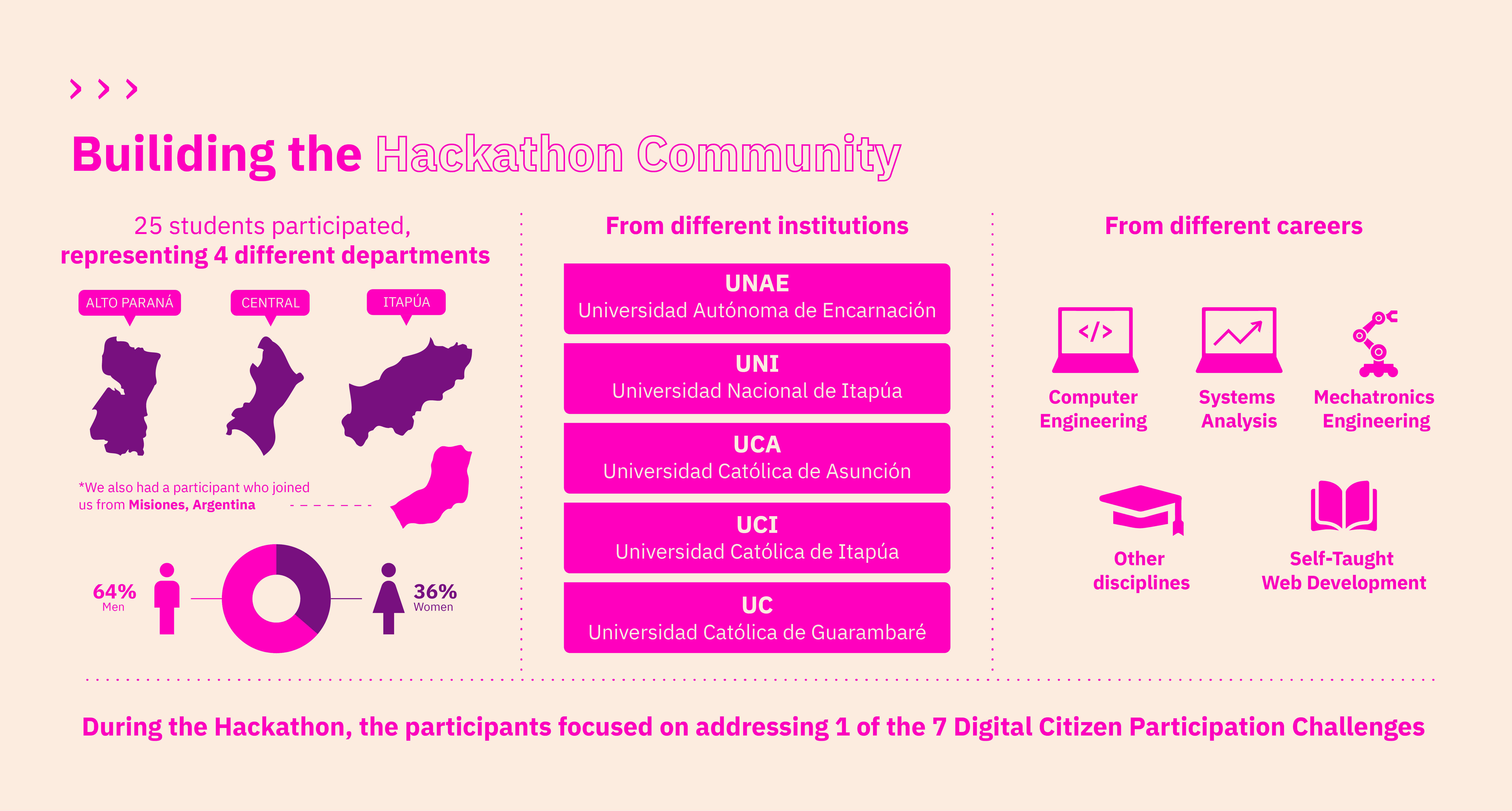
Participatory, local, global and democratic governance
This type of event promotes the learning and collaboration of multidisciplinary work teams and citizens, to improve the dialogue that is generated with the government, to facilitate or improve decision-making through the application of technology in some aspects of the democratic governance.
The collaboration that took place within this Hackathon was not only local, but global. We partnered with the open source platform Decidim.org, developed with free software to facilitate all kinds of participatory processes. Decidim has a series of success stories in different countries around the world, and during the Hackathon, we received the support of platform experts who advised the teams in real time while they were developing their demos.
What challenges were the teams looking to solve?
Each team had the option of choosing the social challenge they wanted to face, and less than 48 hours to develop their proposal: design, program, create a demo and a pitch for the final. Read more about their ideas:
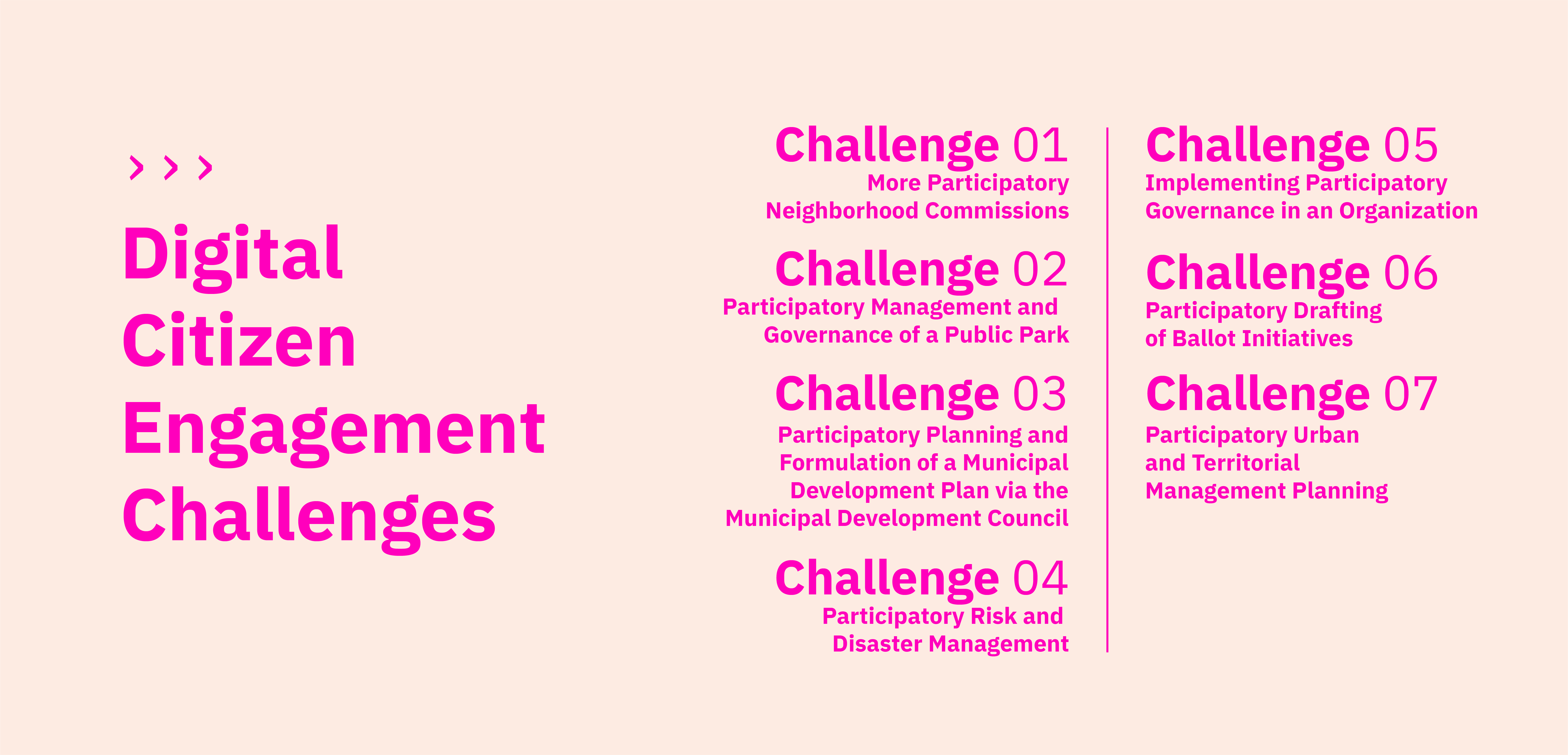
Barrioaviso (Informed neighborhood) - citizen notifications by SMS
The project seeks to increase citizen participation through SMS notifications to nearby residents about activities that are organized by neighborhood commissions in the area.
Unidos por La Paz - Participatory neighborhoods
This initiative designed digital tools to coordinate neighborhood help actions, with a focus on increasing participation of residents of La Paz neighborhood through neighborhood commissions.
Ciudadanos en alerta - inform, connect and solve
This team developed the prototype of a participatory risk management system, focused on generating alarms for citizen security and protection.
Villeta.participa
This team designed a WhatsApp chatbot connected to the Decidim platform, so that citizens can upload their complaints, as well as report civil and environmental risks. Everything that is reported can be viewed in Decidim.
Momarandu - participatory code
This platform seeks to encourage participation of neighborhood commissions and Municipal Development Councils in the follow-up and monitoring of social development projects in Coronel Bogado, to achieve greater transparency in the execution of activities that are part of the City’s Municipal Development Plan.
Elcheckverde - ✅- environmental agenda
This team designed digital tools for citizens to work more efficiently in collaboration with municipalities in the development of activities and actions that have a local environmental impact, such as: coordinating cleaning actions through a calendar and an interactive map, with the goal of reducing risks and disasters in the community.
Barriers and Opportunities for Civic Technologies
This Hackathon leaves us multiple lessons about the challenges in the development of technologies to facilitate or improve citizen participation processes.
The main opportunities identified by the participants:
The greater use of technology in all social spheres and age groups is increasing in the demand for applications and digital tools to solve daily problems and facilitate citizen interaction;
The existence of open source digital tools, such as the Decidim platform, with modules and components adaptable to multiple needs, that could accelerate the adoption of these tools to facilitate participatory processes; and
The increasing numbers of young designers, developers and activists, passionate about technology, who -with greater support to develop capacities to quickly interpret the real needs of the community- could translate digital interaction tools into real spaces of citizen participation.
Some of the challenges and limitations to overcome, identified by the participants:
The scarcity of training tools, manuals and tutorials on Decidim.org available in Spanish, and easy to understand to overcome technical and methodological difficulties, added to the steep learning curve for technological development that many of these platforms bring with them;
The complex structural barriers to citizen participation, which requires having interdisciplinary teams and/or limiting the challenges to design problems that can effectively be addressed with digital tools;
The digital division or exclusion gaps, which requires intensifying learning sessions with potential users to interpret their requirements, guarantee their dissemination and guide their appropriation; and
The need to increase the intensity of social interactions between participants, mentors, users and institutions, generating greater spaces for exchange and socialization, in order to generate a community of practice with projections to be consolidated in the future.
Looking to the future: how is this exploration going?
The two winning teams were Villeta Participa and Ciudadanos en alerta. These two teams accessed a paid, flexible, and remote internship program at the UNDP Acceleration Laboratory in Paraguay, to continue exploring the development of digital platforms for citizen participation, with the support, mentoring and connection with communities and institutions that can host the experiences and tools they developed in this process.
The teams also gained experience developing open source digital public goods , interacting with an international open source community such as the one that maintains Decidim.org.
The internships have taken place between June and August 2023, according to specific contracting conditions agreed between the team and the UNDP Acceleration Laboratory. The members of Ciudadanos en Alerta successfully finished their internship and this blogpost summarizes their experiences and learnings. Villeta Participa is currently developing their internships and more information about what they are proposing will appear in future blogpost of this series of learnings on participatory governance in Paraguay.
“Spaces like this are necessary, because the first article of our National Constitution says that our republic is representative, participatory and pluralistic. We fall short on the participatory part and all the tools that you presented [Today] are related to effective citizen participation”Keiji Ishibashi
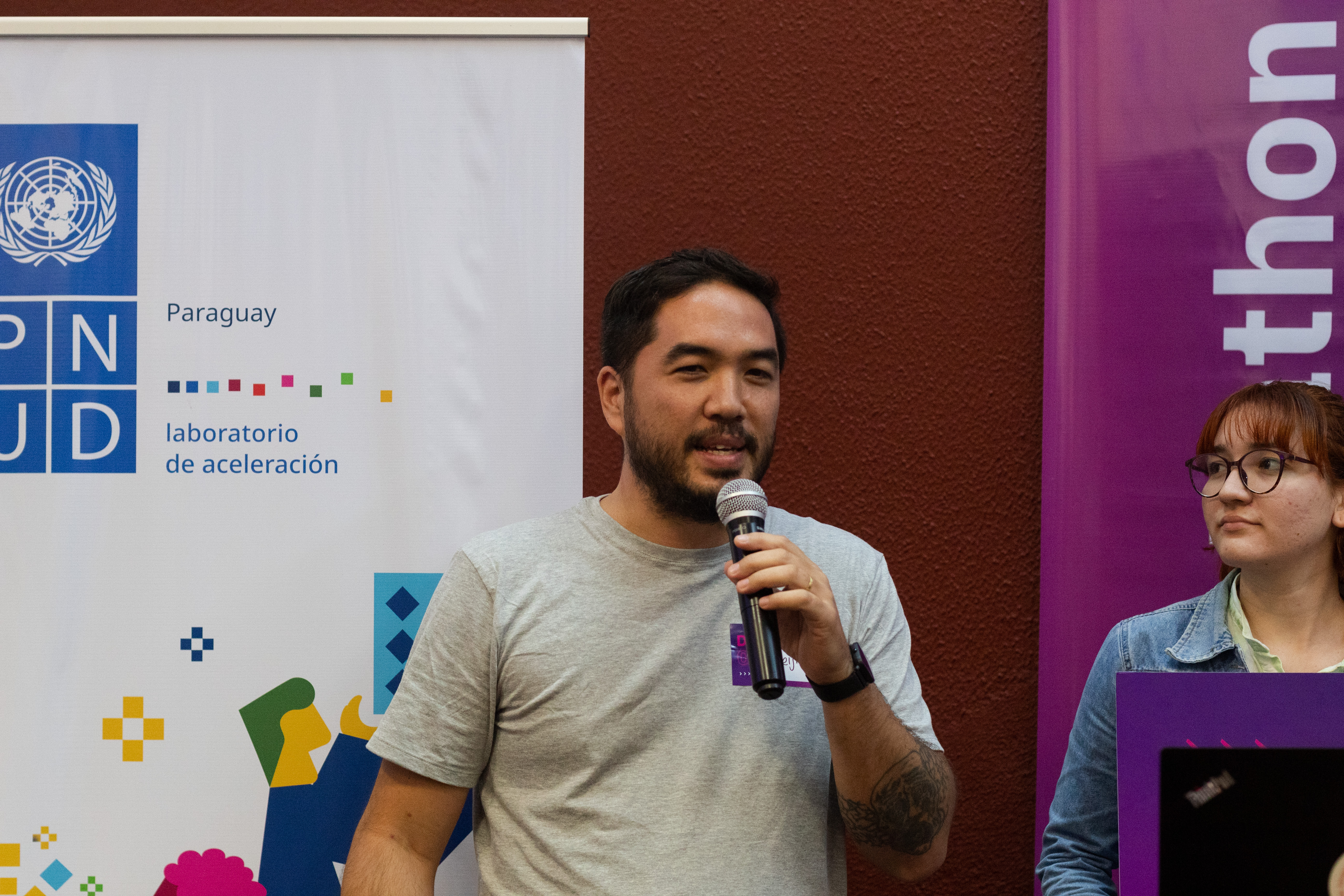
Keiji Ishibashi, Encarnación Municipal Councilor and part of the jury of the event.
The Civic Technologies Hackathon is part of Tavarandu, the Innovation Program for Participatory Governance, which is developed by the UNDP Acceleration Laboratory in Paraguay and Girls Code, in partnership with Decidim, the Autonomous University of Encarnación and the National University of Itapúa. Find out more about the event and watch the final on GirlsCode's YouTube channel.
This blogpost is the first of a series of learnings on participatory governance in Paraguay. While the next ones arrive, you can read more about the seed of this portfolio of interventions and learning, in our series on Social Capital in Paraguay: Part I and Part II.
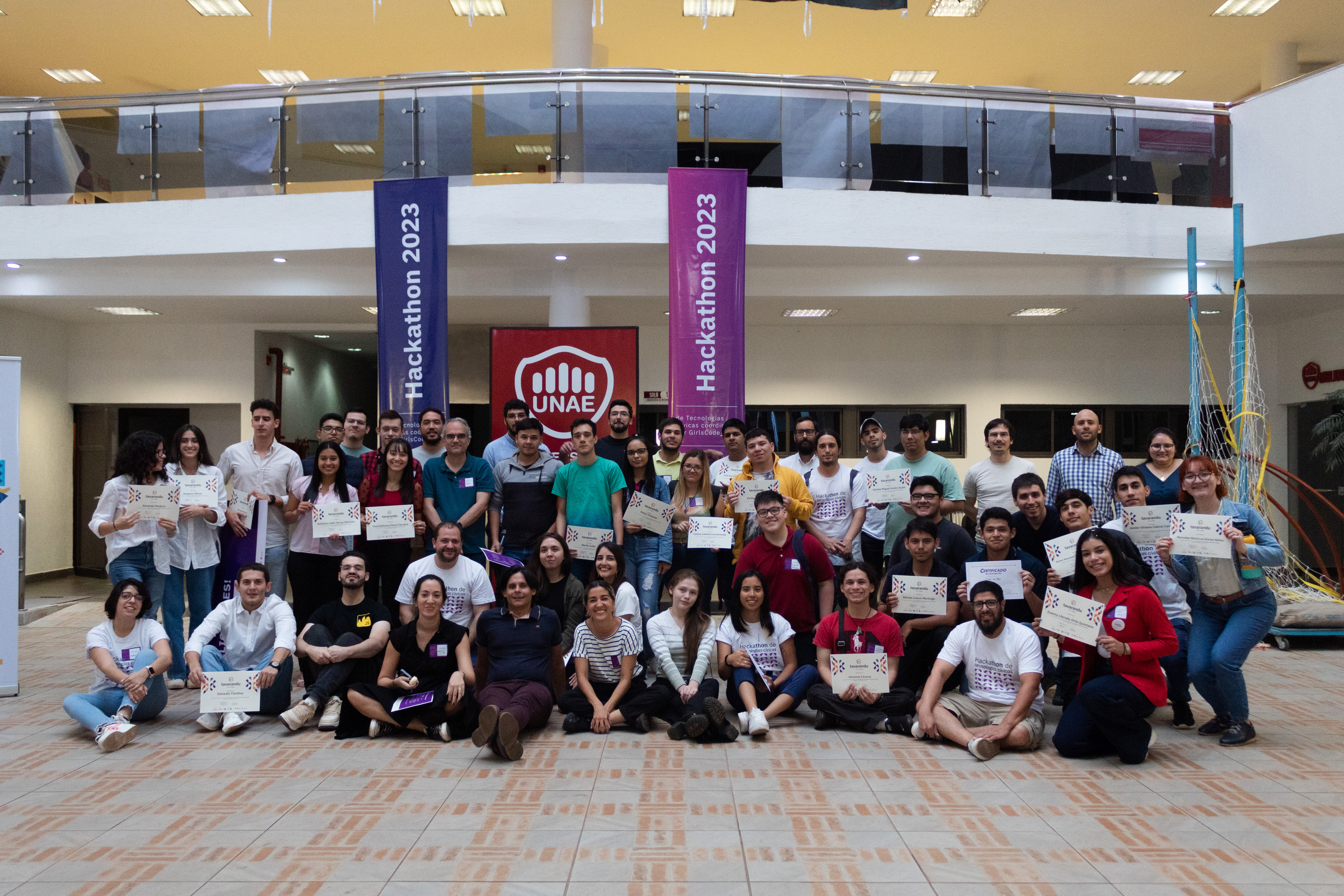
Hackaton participants.
[1] Civic Participation of youth in the digital world. UNDP, 2021.
[2] Held, David. Models of democracy. Polity, 2006.

 Locations
Locations




